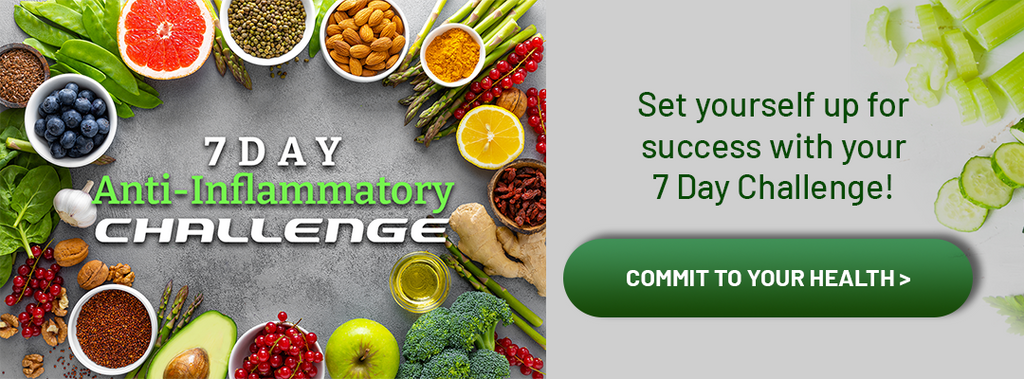Doctors are discovering that one of the most effective strategies to reduce inflammation is to use nutrition rather than medication. Science has proven that chronic, low-grade inflammation can turn into a silent killer that contributes to cardiovascular disease, cancer, type 2 diabetes and other conditions.
When your body senses something alien, such as an invading bacterium, plant pollen, or chemical, your immune system is engaged. Inflammation is frequently triggered as a result of this. Your health is protected by intermittent bouts of inflammation directed towards truly dangerous invaders.
However, sometimes inflammation persists, day in and day out, even when you are not threatened by a foreign invader. That's when inflammation can become your enemy. Many major diseases that plague us—including cancer, heart disease, diabetes, arthritis, depression, and Alzheimer's—have been linked to chronic inflammation.
Food that Combat Inflammation
You can control — and even reverse — inflammation through a healthy, anti-inflammatory diet and lifestyle. People with a family history of health problems, such as heart disease or colon cancer, should talk to their physicians about lifestyle changes that support preventing disease by reducing inflammation.
Salmon and Other Fatty Fish
Salmon contains omega-3 fatty acids—more than any other type of fish or seafood. Studies suggest people who eat more of these fatty acids may be less likely to suffer from dry eyes.
It's also good for the heart because the healthy fats lower inflammation11 and keep cholesterol in check.
The American Heart Association suggests eating fatty fish, such as salmon, sardines, and mackerel, at least twice a week. Salmon is a great choice because it is a good source of an antioxidant called astaxanthin.

Nuts and Seeds
Walnuts are a good source of healthy fats, protein, vitamin E, minerals, and phytochemicals called sterols. They also contain monounsaturated and omega-3 fatty acids that are good for your heart. Walnuts are energy-dense, so you may need to watch your portion size. Even though they are high in calories, a handful can help you feel full longer. In that way, they may actually help you lose weight.
Almonds are a great source of monounsaturated (healthy) fats, vitamin E, and manganese. They’re also rich in magnesium and plant protein. In research studies, eating almonds has been associated with a lower risk of heart disease. They may improve the balance of fatty acids in your blood.
Nuts and seeds have lots of nutrients, many anti-inflammatory such as vitamin E and ellagitannins (a type of tannin). The latter, along with the fiber in nuts and seeds, are on the menu for our gut microorganisms, which convert them to anti-inflammatory butyrate.
-
Nuts: Almonds, cashews, chestnuts, hazelnuts, pine nuts, pistachios and walnuts
-
Seeds: Pumpkin seeds, sunflower seeds and sesame seeds
Avocados
Avocados are rich in heart-healthy fats. Plus, they're a a good source of magnesium, fiber, and potassium.
Half an avocado adds nicely to your daily intake of vitamins C, A, E, and B-complex vitamins. Bonus: They're low in sodium.
Avocados also contain polyphenols that work as antioxidants.2 Antioxidants fight cell damage in your body. Add avocado slices to a sandwich or salad, or make a tasty guacamole.
Whole Grains
A whole grain contains both the bran and germ, which gets removed when refined into white flour. That’s a shame, because the bran is rich in fiber, which gets converted into anti-inflammatory butyrate by our gut bacteria. Whole grains are also rich in vitamins, minerals and phytonutrients (beneficial plant compounds) contained within the bran and germ, which fight inflammation in many ways. For example, phenolic compounds in whole wheat and whole rye suppress the production of pro-inflammatory compounds.
-
Barley
-
Brown rice
-
Buckwheat
-
Millet
-
Oats
-
Sorghum (a grain popular in parts of Asia and Africa)
-
Whole rye
-
Whole wheat (bulgur wheat and wheat berries)
Herbs and Spices
One of the major benefits of many herbs and spices is that they block the action of pro-inflammatory cytokines (a type of cell-signaling protein), among other anti-inflammatory properties.
-
Herbs: Dill, marjoram, mint, parsley, oregano, rosemary, sage and tarragon
-
Spices: Allspice, cayenne pepper, cloves, coriander, cinnamon, cumin, ginger, fennel, pepper (black and pink), saffron and turmeric
Cherries
Cherries pack a wallop of antioxidants that help temper inflammation, including anthocyanins (an antioxidant found in red and purple fruits and vegetables) and vitamin C (well-known for its immune-boosting properties). In a review of 29 studies looking at both tart and sweet cherries, 80% of the trials showed that cherry consumption decreased markers for oxidative stress and 70% showed that it lowered inflammation. In the research, people were advised to consume whole fruit, juice or powder in an amount equivalent to 45 to 270 fresh cherries per day, but you don't need to eat that much every day to reap some benefits.
Incorporate more cherries into your diet with smoothies, as a yogurt or oatmeal topper, in sorbet or simply on their own for an easy, naturally sweet snack.
Dark leafy greens

A smart goal to up your nutrition game: a salad a day. Aim for dark leafy greens, like kale, spinach and collards, all of which pack nutrients, most notably lutein, folate and vitamin K, that slow inflammation. It's for that reason that a study in the journal Neurology in 2018 found that eating just one serving per day of greens was associated with slower cognitive decline in aging adults. Research shows that every green offers unique anti-inflammatory properties, so mix things up and get a variety in your diet for the biggest range of benefits.
How to Add Anti-Inflammatory Food into Your Diet
The anti-inflammatory guide is about filling your meals with foods that have been shown to fight inflammation and — just as important — cutting out foods that have been shown to contribute to it. It can be more difficult to find reliable information online.
There isn’t a formal diet plan that outlines exactly what to eat, how much of it, and when. With a variety of things to consider such as ratios of nutritional content, creating a meal plan that's easy, delicious, and effective can be a pain. However, we recommend this Anti-Inflammatory Diet For Beginners Challenge to make incorporating these anti-inflammatory foods into your diet easier.
Jean de Guzman swears by the Anti-Inflammatory Diet For Beginners Challenge. “It is so easy to follow, the challenges are not complicated, the way the information about anti-inflammatory eating is presented makes you feel excited about doing yourself a favor and eating better.” Jean says.
“I have a shelf of diet plans and cookbooks that are simply too complex to put to use in my world. This book is informative and affordable and easy to apply to your daily routine. Nothing fancy - just factual and fun. No stress. At all!”
This Anti-Inflammatory Diet For Beginners Challenge can help you create meals that's proven effective in removing inflammation, easy-to-make, and, not to mention, delicious in minutes. The Anti-Inflammatory Diet For Beginners Challenge makes starting an anti-inflammatory lifestyle easy and simple.
In addition to lowering inflammation, a more natural, less processed diet can have noticeable effects on your physical and emotional health. "A healthy diet is beneficial not only for reducing the risk of chronic diseases, but also for improving mood and overall quality of life.
How to get started
☑ Easy to Follow Daily Challenges
☑ Commit to a Pain-Free Life For FREE
☑ Everything You Need To Know To Get Started
The anti-inflammatory diet entails eating foods that have been proved to combat inflammation while also avoiding items that have been shown to contribute to it. Get the guide and challenge to start and commit to your new lifestyle with the Anti-Inflammatory Diet For Beginners Challenge today!





